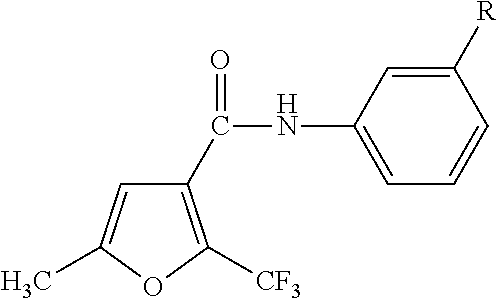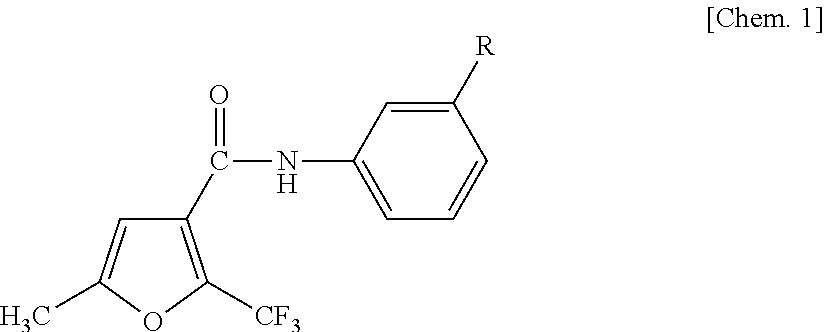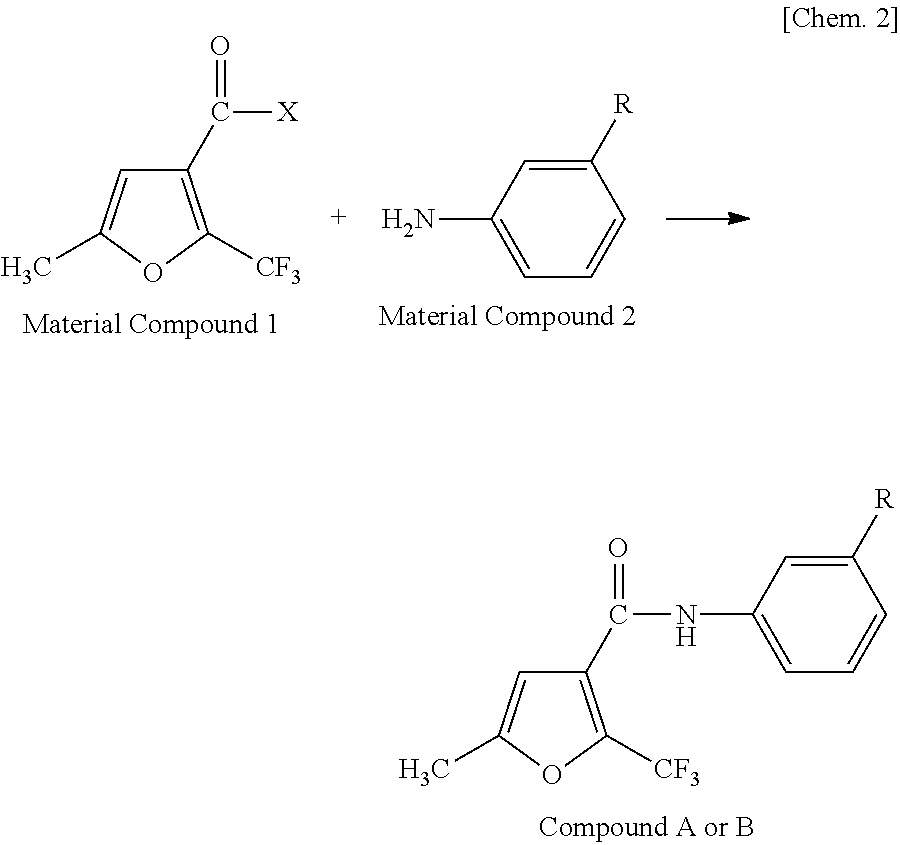Anilide-based compounds for preserving wood and method of use thereof
a technology of anilide-based compounds and wood, which is applied in the field of wood preservatives, can solve the problems of imposing a huge impact on the human body, a great environmental burden, and a significant deterioration in strength, and achieves the effects of small chemical dosage, excellent preservation effect and small environmental load
- Summary
- Abstract
- Description
- Claims
- Application Information
AI Technical Summary
Benefits of technology
Problems solved by technology
Method used
Image
Examples
synthesis example 1
[0054]1.0 g of 5-methyl-2-trifluoromethylfuran-3-carbonyl chloride (manufactured by Namiki Shoji Co., Ltd.) was dissolved in 20 ml of methylene chloride, and 0.66 ml of triethylamine (manufactured by Wako Pure Chemical Industries, Ltd.) was added thereto while being cooled in ice. After adding 0.64 g of 3-isopropyl aniline (manufactured by Tokyo Chemical Industry Co., Ltd.), the mixture was stirred at room temperature for one hour and refluxed for one hour to cause reaction. After cooling the solution, 20 ml of methylene chloride was added thereto. After washing the solution with 40 ml of 1N NaOH, 40 ml of 1N HCl and 40 ml of saturated saline, the solution was dehydrated with Na2SO4 and condensed using an evaporator. The obtained reaction product was purified using silica gel column chromatography, and recrystallized using an ethyl acetate / hexane-based solvent to thereby obtain 1.1 g of colorless crystals of 3′-isopropyl-5-methyl-2-trifluoromethylfuran-3-carboxylic acid an...
synthesis example 2
Compound B
[0057]The same reaction and posttreatment operation were performed as in Synthesis Example 1 using 0.9 g of 5-methyl-2-trifluoromethylfuran-3-carbonyl chloride, 0.56 ml of triethylamine and 0.6 g of 3-isopropoxyaniline (manufactured by Sigma-Aldrich Japan) to thereby obtain 1.0 g of pale yellow crystals of 3′-isopropoxy-5-methyl-2-trifluoromethylfuran-3-carboxylic acid anilide.
[0058]The melting point: 86 to 89° C.,
[0059]1H-NMR (CDCl3) δppm; 7.50-6.62 (5H, m), 6.40 (1H, s), 4.70-4.43 (1H, m), 2.37 (3H, s), 1.37 (3H, s), 1.30 (3H, s)
synthesis example 3
Comparative Compound 1 (Compound Disclosed by Japanese Patent No. 2825745 (U.S. Pat. No. 5,977,168))
[0060]The same reaction and posttreatment operation were performed as in Synthesis Example 1 using 1.0 g of 2,5-dimethylfuran-3-carbonyl chloride (manufactured by Sigma-Aldrich Japan), 0.88 ml of triethylamine and 0.85 g of 3-isopropylaniline to thereby obtain 1.2 g of pale yellow crystals of 3′-isopropyl-2,5-dimethylfuran-3-carboxylic acid anilide.
[0061]The melting point: 81 to 84° C.,
[0062]1H-NMR (CDCl3) δppm; 7.43-6.92 (5H, m), 6.09 (1H, s), 2.98-2.75 (1H, m), 2.58 (3H, s), 2.28 (3H, s), 1.29 (3H, s), 1.22 (3H, s),
PUM
| Property | Measurement | Unit |
|---|---|---|
| temperature | aaaaa | aaaaa |
| boiling point | aaaaa | aaaaa |
| reaction time | aaaaa | aaaaa |
Abstract
Description
Claims
Application Information
 Login to View More
Login to View More - R&D
- Intellectual Property
- Life Sciences
- Materials
- Tech Scout
- Unparalleled Data Quality
- Higher Quality Content
- 60% Fewer Hallucinations
Browse by: Latest US Patents, China's latest patents, Technical Efficacy Thesaurus, Application Domain, Technology Topic, Popular Technical Reports.
© 2025 PatSnap. All rights reserved.Legal|Privacy policy|Modern Slavery Act Transparency Statement|Sitemap|About US| Contact US: help@patsnap.com



